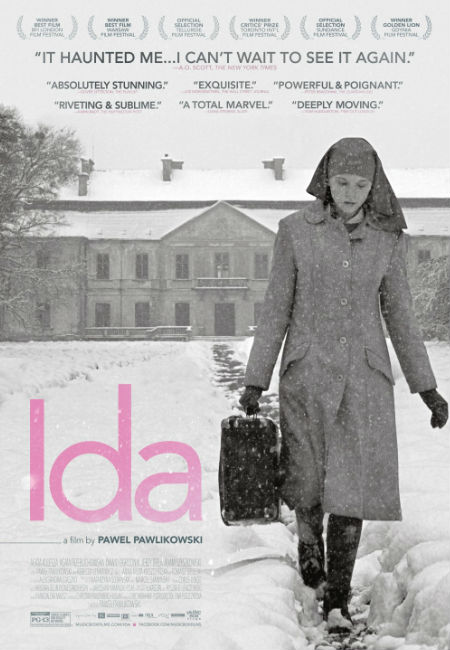
Ida, a starkly beautiful black and white film from director Pawel Pawlikowski, begins much as it means to go on – in austere, almost confronting, silence.
In the snowy depths of a brutally cold 1962 Polish winter, three novice nuns, a week away from taking their final vows, are quietly and faithfully tending to a statue of Jesus, each brush stroke of paint and exertion to lift it back into its accustomed place on a plinth in front of the convent, accompanied only by wordless contemplation and stoic zeal.
The only words spoken initially come from the Mother Superior (Halina Skoczynska) who, summoning a surprised Ida (first time actor Agata Trzebuchowska) to her office, quickly and efficiently informs the quiet-as-a-mouse novice, who looks perpetually on the verge of running and hiding at the least provocation, that she has a relative, an aunt who lives in a nearby town, who must be visited before the young lady can take her vows.
Ida’s enthusiasm for this mandatory, and wholly unexpected, family reunion – she has lived at the convent since she was a child, orphaned during the Second World War – is palpable, her slow trudge through the eerily peaceful winter landscape a study in visible reluctance.
And when she finally makes it to her aunt Wanda’s (Agata Kulesza) apartment, you begin to suspect she has good cause to be less than thrilled with the task at hand, as she is greeted with an icy, almost cruel dismissiveness only a few degrees in iciness above the brutal weather outside.
Wanda, a judge and therefore an esteemed member of the communist ruling class who oversee post war-Poland with words of brotherly inclusion and acts of elitist exclusion, is a mess, awash in vodka, chain smoking and meaningless sex whose bitterness is so manifest as to almost be a third presence in the dimly lit and minimally furnished rooms.

If Ida was dreaming about finding out more about her family, which it becomes quite clear she wasn’t, content to live a life of poverty, abstinence and emotional repression behind the convent’s high stone facade, it is likely evaporating with each anger-syllable that Wanda grudgingly shares with her.
In short order she is told she is Jewish, that her real name is Anna Lebenstein, and that her parents, Wanda’s sister and her husband, were killed in the Polish countryside where they were hiding from the Nazis during the war, their final resting place unknown.
It is hardly the most cordial of reunions, and with Wanda appearing to have nothing more to offer than cynicism and copious amounts of second hand smoke, a passive Ida, relieved to be done with her mandated meeting with a family member who clearly wants nothing to do with her, leaves for the bus station and home.
And this is where Ida, a tautly-written, emotionally-charged (despite the held-in-check nature of almost all the exchanges in the film) 80 minute examination of coming to terms with your past, comes alive, as it were.
Retrieved from the terminus by a regretful Wanda, who warms up somewhat sharing photos and anecdotes of her long lost family, Ida becomes a powerfully-told story of reconciling yourself with your past, of confronting that is which is hidden or in the case of Ida, blissfully unknown.
Throughout the course of a road trip that takes them back to their now usurped family farm and family graves, both women must come face to face with a past as ugly and brutal as anything to emerge from the six terrible years of nazi occupation.
But their reactions are as markedly different as their lifestyles, Wanda a woman who cannot be mollified by what they discover and then lay to rest after a fashion, and Ida, despite a brief flirtation with worldly pleasure via saxophonist Lis (Dawid Ogrodnik), returning to the life she knew, her face looking as unmoved and unaffected as ever (though she displays a strength and force of will at various points not immediately apparent in her usually impassive countenance).

Despite its uncomfortable revelations, its undercurrent of bitterness, separation, and despair, Ida is a gorgeously contemplative film, an immersion into the quiet, endlessly peaceful of Ida’s soul, one that is seemingly untouched by the events of the film.
But of course that is merely a surface reaction on Ida’s part, schooled by years of remaining emotionally aloof in the orphanage, and you can see in Trzebuchowska’s endlessly expressive eyes a multitude of longing, sadness, anger, deep thinking, and finally, acceptance of the path she has chosen in life.
Some might see her choices as a waste, of failing to come to terms with the pain and loss she and Wanda have suffered and burying it, but Ida is, in the end, all about choices – how do you respond to revelations as shocking as the ones in the film?
Do you rail against the world? Take to the bottle with vodka-soaked bitterness as Wanda does? Pretend none of it ever happened? Run far away from it all, hoping you can outrun yourself?
Or simply continue as you were, as Ida does, leaving the past where it is, and moving on to the life you have chosen, as at peace as anyone can be with this sometimes monstrous thing we call life.